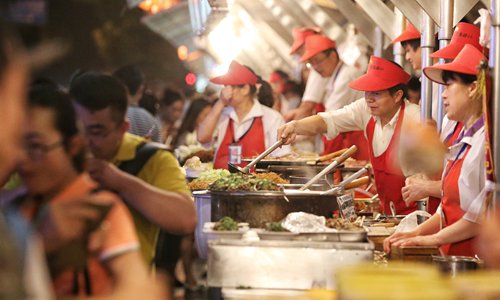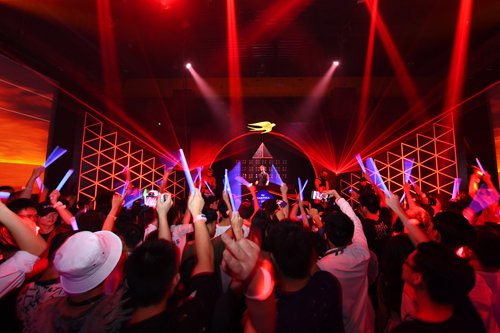
From the People's Daily app.
And this is Story in the Story.
The Chinese capital is encouraging the local business sector to open more 24-hour shops and restaurants as a way of boosting its economy.
Late night coffee shops, 24-hour hotpot restaurants, and glittering window displays are common things in cities in southern China, as local residents tend to spend more time out of their homes after work.
Now authorities in Beijing aim to encourage nighttime consumption by planning more 24-hour convenience stores and restaurants in the city in 2019.
The Beijing Municipal Commerce Bureau will unveil policies to boost late-night consumption, a key focus for the new year, Yan Ligang, director of the bureau, told a recent industry conference. To enliven the city, the bureau will support opening more 24-hour convenience stores and encourage some shops and supermarkets to extend their working hours.
Compared to residents in other major cities like Shanghai and Hangzhou, East China's Zhejiang Province, and Shenzhen, South China's Guangdong Province, people living in Beijing have fewer places to go during late nights.
Today’s Story in the Story looks at the dilemma facing businesses as they weigh up their potentially lower profit margins against the costs of staying open all night.

Residents enjoy snacks at Beijing's Donghuamen night market before it was closed in June 2016. (Photo: VCG)
The local government in Beijing launched a campaign in support of the late-night economy at the beginning of 2018 and granted as much as 100,000 yuan ($14,600) in financial support to qualified restaurants.
Local supermarket chain Beijing Chaoshifa has already extended its opening hours to 24 hours in some of its stores and is diversifying its business, introducing new convenience stores and book shops.
Beijing's foody paradise Gui Street, which is famous for its crayfish restaurants, is now studying how late to stay open. Some popular places as Huda restaurant are likely to stay open late in order to increase their customer base, said He Baogui, secretary-general of the Beijing Food and Beverage Industry Association.
"However, it might not be feasible for some restaurants to extend opening hours, and we're now surveying a 'late-night consumption' proposal with local restaurants to see how to make the whole street prosperous during the night," he said.
As part of a security campaign, authorities in Beijing have imposed tight security measures in recent years on buildings in inner city areas and shut down some bars, restaurants and stores in fire-prone buildings.
However, some local consumers and industry representatives called for more active measures to support stores with local characteristics and inject new energy into the nightlife of the city.

Imported spirits grab bigger shares as China's nightlife gains popularity. (Photo: Global Times)
Xiao Xing, a white-collar worker living in Chaoyang district, said she hopes to see more late-night restaurants in the neighborhood. "I usually work till 11 pm. There are few [restaurant] choices at that time," she said, noting that besides going to hotpot restaurants, she usually must order food online.
As a way of boosting consumption, boosting the late-night economy will also help maintain the growth momentum of retail sectors, which has been slowing down since the beginning of 2018 amid cooling economic growth.
Restaurants and stores that stay open late will see higher costs such as increased electricity fees and labor costs, Lai Yang, director of the Beijing Research Institute Strategy, said.
"Also, Beijing authorities have to work more to keep late-night activities safe, which all needs government support," he said.
In a report by Ant Financial, an affiliate of Chinese e-commerce giant Alibaba Group Holding, which analyzed online payment data during the night, Beijing is deemed as a city for middle-aged people, as most of them spend the shortest amount of time on dinner or late-night snacks compared to dwellers in seven other cities including Shanghai, Hangzhou and Shenzhen.
Meanwhile, Beijing residents get much more sleep than people in other big cities, leading to more restaurants being vacant after 11 pm.
(Produced by Nancy Yan Xu, Brian Lowe, Lance Crayon, and Chell Wenqian Zeng. Music by: bensound.com. Text from Global Times.)


